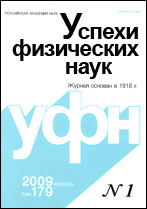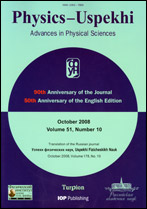|
This article is cited in 32 scientific papers (total in 32 papers)
REVIEWS OF TOPICAL PROBLEMS
Nonconservation of baryon number under extremal conditions
V. A. Matveev, V. A. Rubakov, A. N. Tavkhelidze, M. E. Shaposhnikov
Institute for Nuclear Research of the USSR Academy of Sciences
Abstract:
In gauge theories with left-right asymmetric fermion composition (e.g., in the standard model of electroweak interactions), the fermion number F is not conserved because of the anomaly $\partial_\mu j_\mu^F\sim F_{\mu\nu}\widetilde F_{\mu\nu}$. In models with small coupling constants, the amplitudes for processes with anomalous nonconservation of the fermion number are exponentially suppressed under normal conditions. It is shown that these are fast processes under extremal conditions, i.e., in the field of a magnetic monopole and at high densities and temperatures. An F-nonconservation mechanism associated with a level crossing phenomenon in external gauge fields is described. The theory and the experimental consequences of the monopole catalysis of proton decay are discussed. It is shown that both Abelian and non-Abelian gauge theories have a critical density above which cold fermion matter becomes absolutely unstable. The absence of the suppression of the anomalous electroweak nonconservation of fermion number at high temperatures is demonstrated, and the cosmological consequences of this phenomenon are discussed. The strong nonconservation of the fermion number in the decay of heavy fermions and technibaryons is also considered.
Citation:
V. A. Matveev, V. A. Rubakov, A. N. Tavkhelidze, M. E. Shaposhnikov, “Nonconservation of baryon number under extremal conditions”, UFN, 156:2 (1988), 253–295; Phys. Usp., 31:10 (1988), 916–939
Linking options:
https://www.mathnet.ru/eng/ufn7862 https://www.mathnet.ru/eng/ufn/v156/i2/p253
|


|





 Contact us:
Contact us: Terms of Use
Terms of Use
 Registration to the website
Registration to the website Logotypes
Logotypes








 Citation in format
Citation in format 
